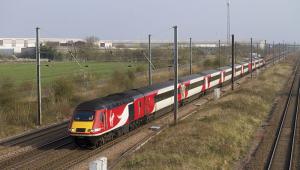Every January, the New Year opens with bad news about the railways.
The rise in fares that is imposed in time to greet people renewing their season tickets at the start of the year is usually compounded by tales of rail chaos, induced either by the weather or by management incompetence.
Last year it was certainly the latter, when engineering work overran, but this year it was mostly the result of incredible bad luck: the West Coast Main Line shut no fewer than four times because of, first, a plane crash and then three failures of the overhead electrification equipment for unrelated reasons on successive days.
The criticism given to the industry in the press was, therefore, partly unfair because it can hardly be blamed for errant light aircraft. But the unpopularity of the above-inflation fare increases has left the railways vulnerable to attack on the slightest pretext.
This bad start is the prelude to what promises to be the most tumultuous year in the industry’s history since the mid-1990s privatisation.
On the negative side, railways always fare badly in a recession. They have high fixed costs and are particularly vulnerable to even small losses of income. Their situation has been made even more precarious by the government’s attempt to rein back on the £5bn annual subsidy as it plans to cut the taxpayers’ contribution to the railways from a half to a third within five years.
The recession could not have come at a worse time for the train operators and the fare rises might not help them. Several franchise contracts signed over the past two years involve rapidly increasing premium payments from the operators and a loss of revenue at this stage could quickly plunge them into the red.
There have been fare increases across the board, with unregulated fares soaring by 7%, and some, particularly those on busy routes, rising by up to 11%, causing outrage among passenger groups. This might even prove to be a deterrent to many passengers, reducing the revenue expected.
As for good news, the massive West Coast Main Line refurbishment project, costing a staggering £9bn, is at last complete and Virgin has been able to increase the speed and frequency of its trains from Euston to Birmingham, Manchester, Liverpool and Glasgow. The government has announced it will accelerate the acquisition of 200 of the promised 1,300 extra rail vehicles it plans to introduce by 2014. It has reiterated its commitment to Crossrail, although, as reported in Public Finance last September, there are still doubts about the precise funding.
On a strategic scale, too, things are moving. Electrification, ditched by the 2007 rail strategy white paper, is now definitely back on the agenda, and so is the notion of a new North-South high-speed line — which was also shelved during Alistair Darling’s long tenure at transport.
So, oddly, just as the railways are heading for short-term problems, there is a renewed enthusiasm at the Department for Transport, prompted by the energy of the new rail minister Lord Adonis, for positive long-term thinking on the railways.
But a word of caution. We have been here before. The ten-year Transport Plan published in 2000 with the enthusiastic support of John Prescott, who was then in charge of transport, promised 25 new light rail schemes by 2010, 24 more than the number that will actually be delivered.
The trouble with the railways is that they need long-term support for sustained investment, such as Spain’s remarkable plan for 10,000 kilometres of high-speed line by 2020.
Surprisingly the Tories not only support a new high-speed line, but they promoted the idea before the arrival of Lord Adonis at the department. The crucial issue is funding. Whereas in Spain and elsewhere on the continent, governments are prepared to guarantee the funding for such big infrastructure schemes, neither major party here has suggested this would be possible. Instead, there will be an endless and probably fruitless search for a complex deal involving the transfer of risk to a reluctant private sector.
In any case, since work would not start for several years, there is no prospect of a new line being completed much before 2020, offering little solace for today’s commuters facing higher fares and possible cutbacks in service.
This strange prospect of pain today and jam tomorrow is a product of the traditional reluctance of politicians in Britain to fully endorse the railways.
If there were the kind of wholehearted support seen in Europe, then the Crossrail funding would have long been assured and a commitment to a new high-speed line would have already been made. And fares would not be going up at rates well above inflation.










